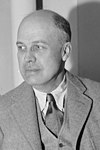Welcome! Check out today's deaths, recent deaths, or our deaths stats.
Feeling experimental? Head on over to our newest (and darkest) feature: Next-2-Die™ predictions
 Edward Hopper
Edward Hopper

Edward Hopper, one of the leading figures of 20th century American realism, passed away at age 84 in New York City on May 15, 1967. After studying illustration at New York's School of Art, Hopper worked as a commercial artist and began painting in earnest around 1905. He gained prominence as a painter in the 1920s and 1930s and was known for his unique style of urban and rural American scenes, typically depicting loneliness and alienation. His early works were mostly watercolors while he shifted to oil painting in the mid-1920s. He moved to New York's Greenwich Village in 1910 and lived there until his death. Early inspiration came from works such as Winslow Homer’s "The Fog Warning" and Edward Muybridge’s motion studies. Hopper had no formal ties to any artistic movement, but his works often evoke the feelings associated with surrealism and symbolism. "Nighthawks" (1942) and “House by the Railroad” (1925) are among his most famous works. Hopper's first solo exhibition was at the Rehn Gallery in 1924, and he went on to have a continuous presence in New York's art scene for the remainder of his life. He received numerous awards, including the Grand Prize for Painting from the Carnegie International Exhibition in 1959 and the National Medal of Liberty in 1964. His works are held in the permanent collections of major institutions such as the Museum of Modern Art and the Whitney Museum of American Art. Hopper was a major influence on many of his contemporaries and on generations of artists to come. He will be remembered for his authentic, often melancholic portrayal of American life.
Man always thinks about the past before he dies, as if he were frantically searching for proof that he truly lived. Jet Black
